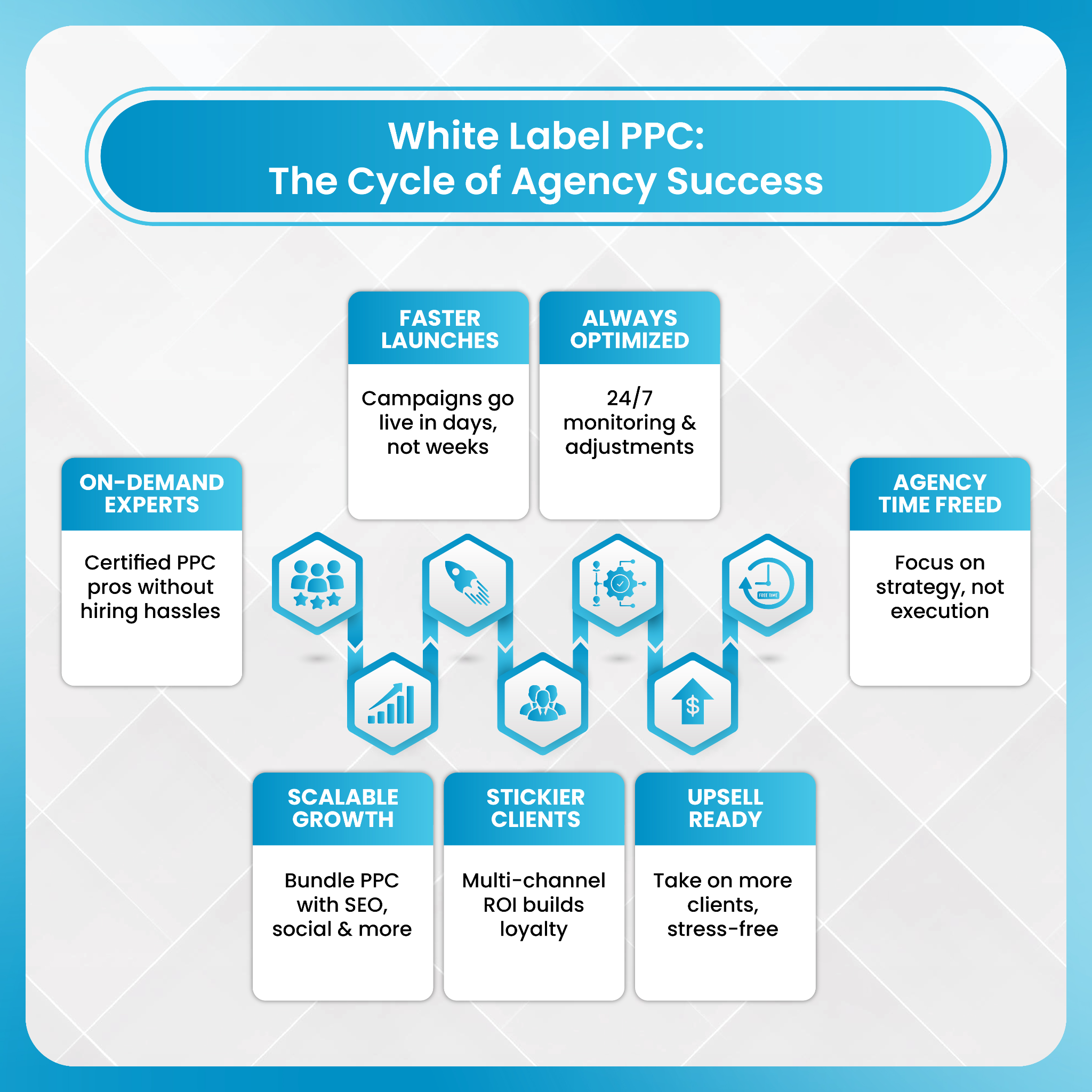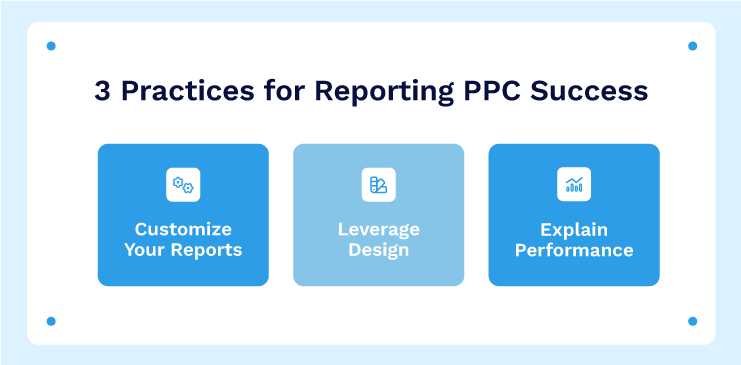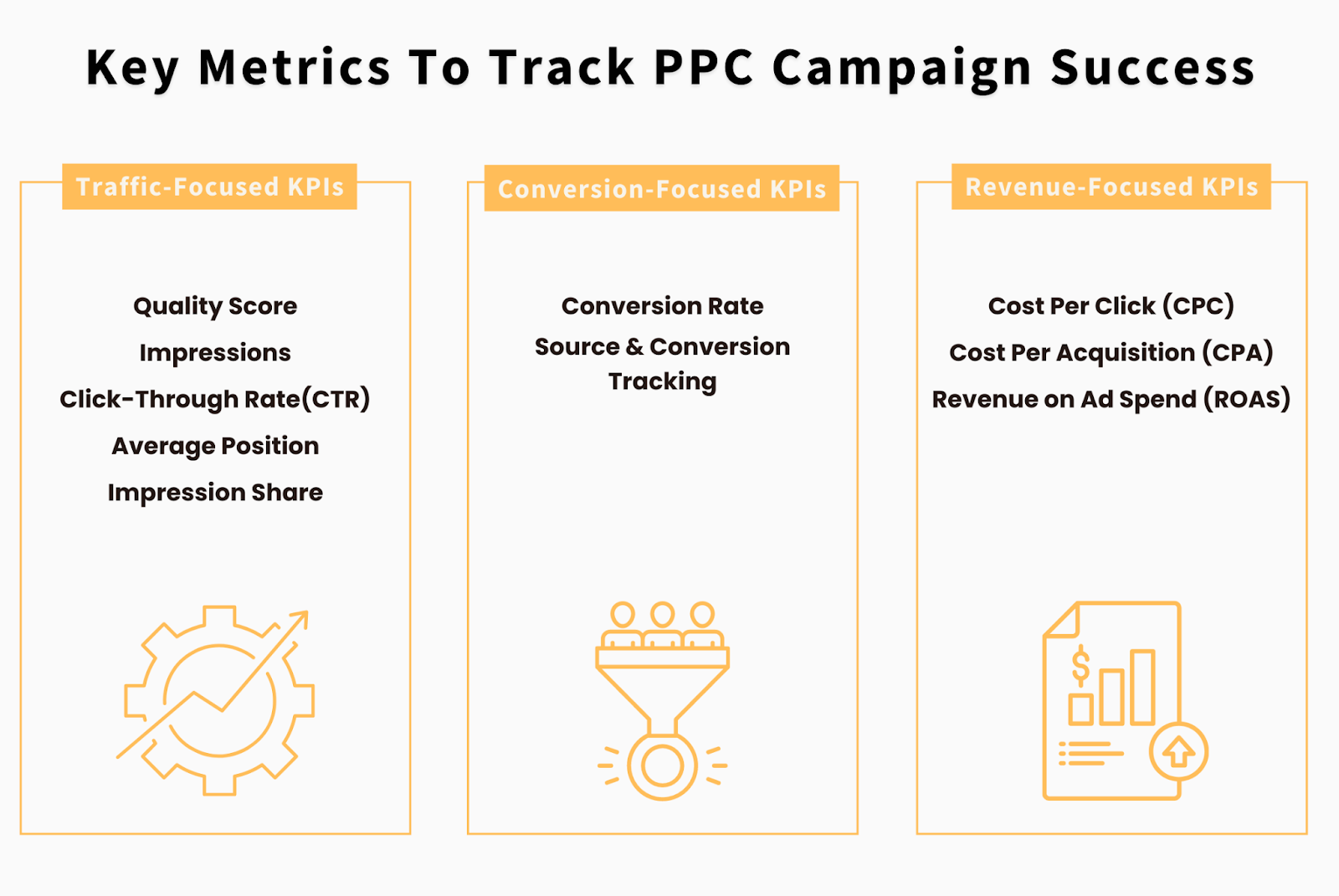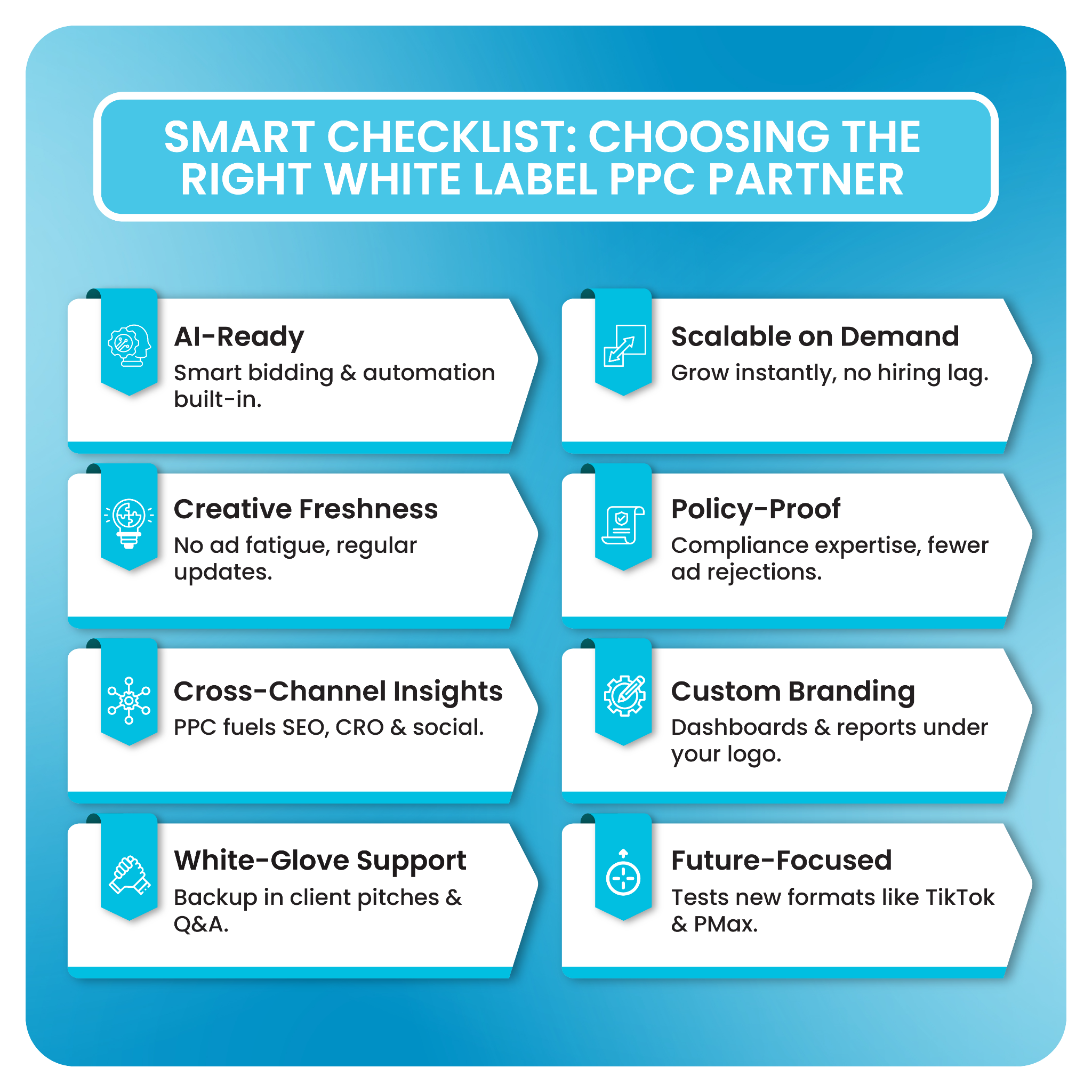PPC advertising is unforgiving territory where every dollar matters. When global digital ad spend reached $667 billion in 2023, with PPC accounting for over 40% of total spend according to Statista, clients began expecting sophisticated handling of their investment. One poorly optimized campaign can instantly erode trust and destroy margins that took months to build.
Many agencies turn to white label PPC partners to scale operations and access specialized expertise. However, choosing the wrong partner can be catastrophic. Unlike other marketing services where mistakes unfold over weeks, PPC failures are immediate and measurable. Your clients see the results in real-time through their ad platform dashboards.
This guide reveals the specific pitfalls that plague agencies when selecting white label PPC services, going beyond generic outsourcing risks to address the unique challenges of pay-per-click advertising partnerships.
Pitfall 1: Choosing Based on Cost Instead of Value
The most dangerous trap agencies fall into is selecting the cheapest white label PPC agency available. These budget providers typically rely on cookie-cutter campaign setups and neglect the ongoing optimization that PPC demands.
Successful PPC campaigns require constant attention. Bid adjustments, keyword refinement, ad copy testing, and audience targeting need regular updates based on performance data. Cost-cutting partners skip these crucial optimizations to maintain their low prices.
Consider this reality: saving $500 on monthly management fees can easily result in thousands of dollars in wasted ad spend. Poor keyword targeting, ineffective ad copy, and suboptimal bidding strategies drain budgets faster than you can imagine.
As Brad Geddes, Co-Founder of AdAlysis, puts it: "In PPC, you don't save money by underpaying your strategist — you burn it twice as fast in wasted ad spend."
The math is simple. A 20% improvement in campaign performance on a $10,000 monthly ad budget delivers $2,000 in additional value. A cheap partner who saves you $300 but reduces performance by 15% actually costs you $1,500 in lost results.
Pitfall 2: Lack of Niche or Industry Experience
PPC strategy varies dramatically across industries. A partner excelling in e-commerce campaigns may struggle with local lead generation or B2B SaaS due to fundamental differences in customer journeys, conversion tracking, and success metrics.
Legal industry keywords can cost over $50 per click, according to WordStream's 2024 data. Healthcare, insurance, and financial services face strict compliance requirements that inexperienced partners often overlook. E-commerce campaigns focus on ROAS and shopping feeds, while B2B companies prioritize lead quality and sales cycle alignment.
When agencies become the "test case" for a partner's first foray into their industry, the learning curve comes at the client's expense. An agency specializing in dental practices needs a white label PPC partner who understands patient acquisition costs, local search behavior, and dental-specific compliance issues.

Pitfall 3: Poor Transparency in Budget Allocation
Some white label PPC partners obscure how they allocate client budgets between actual ad spend and management fees. This lack of transparency becomes problematic when clients demand detailed breakdowns of their investment.
Hidden markups on ad spend, bundled fees that combine multiple services, or unclear reporting on where dollars actually go create trust issues. In PPC, clients can log directly into Google Ads or Facebook Ads Manager to see their spending. If your partner's numbers don't align with platform data, you'll face difficult conversations with clients.
Kirk Williams from ZATO Marketing emphasizes: "Agencies live or die on transparency. Clients can log into Google Ads anytime. If your partner isn't aligned, it will come back to bite you."
Transparent partners provide clear breakdowns showing exactly how much goes toward ad spend versus management fees, platform costs, and any additional charges.
Pitfall 4: Overreliance on Automation Without Strategy
Many PPC partners lean heavily on Google's automated bidding and Smart Campaigns to reduce manual work. While automation tools are powerful, they require strategic oversight to deliver optimal results.
Automated bidding strategies need proper conversion tracking setup, historical data for machine learning, and ongoing monitoring to prevent budget waste. Smart Shopping campaigns can perform well but may lack the granular control needed for competitive industries.
According to Hanapin Marketing's 2023 survey, 32% of marketers cite "lack of strategic oversight with automation" as their top PPC concern. Clients expect strategic differentiation, not a "set-and-forget" approach that any competitor can replicate.
One agency reported a 35% drop in ROAS after switching to Smart Shopping campaigns without proper oversight. The automated system is optimized for volume rather than profitable conversions, leading to budget waste on low-value traffic.
Pitfall 5: Weak Communication and Reporting Cadence
PPC performance fluctuates daily based on competition, seasonality, and market conditions. Slow or generic reporting fails to address the dynamic nature of paid advertising and undermines client confidence.
Some partners send monthly spreadsheet reports without actionable insights or context for performance changes. This approach ignores the fact that PPC campaigns may need immediate adjustments when performance drops or opportunities arise.
According to Search Engine Journal's 2023 research, 62% of clients rank "transparent reporting" as the #1 factor in agency retention. Agencies need partners who provide white-labeled dashboards, proactive communication about campaign changes, and clear explanations for performance variations.
Effective partners establish crisis management protocols for account suspensions, policy violations, or sudden performance drops that require immediate attention.

Image Source: AdClicks
Further Reading: PPC Reporting Strategies: 11 Things You Should Include in a PPC Report
Pitfall 6: One-Size-Fits-All Campaign Structures
Lazy PPC partners reuse identical campaign structures across all clients regardless of industry, goals, or market conditions. This approach leads to poor Quality Scores, higher costs per click, and reduced competitiveness.
Campaign structures should reflect the customer journey, geographic targeting requirements, and specific business objectives. A law firm needs different ad groups and keywords than an e-commerce store, even if both target local customers.
Generic approaches often use broad keyword groups, templated ad copy, and rigid bidding structures that don't account for client-specific factors. This results in irrelevant traffic, wasted budget, and missed opportunities for better-targeted messaging.
Pitfall 7: Compliance and Policy Blind Spots
Regulated industries like finance, healthcare, legal services, and housing face strict advertising policies across all major platforms. An inexperienced partner who doesn't understand these requirements can trigger account suspensions or policy violations.
Google blocked 5.5 billion ads in 2023 for policy violations, according to its Ads Transparency Report. Account suspensions not only halt advertising efforts but can also impact organic search rankings and overall online presence.
Financial services ads must comply with truth-in-lending requirements. Healthcare advertisements need specific disclaimers and cannot make certain medical claims. Real estate ads face fair housing compliance issues.
Agencies working with regulated clients must verify that their white label PPC agency has specific experience navigating industry policies and compliance requirements.
Pitfall 8: Lack of Agility in Scaling Campaigns
PPC campaigns often need rapid scaling during promotions, product launches, or seasonal opportunities. Some partners struggle with sudden budget increases or multi-platform expansion requirements.
Successful scaling requires experience with increased competition at higher spend levels, budget pacing across multiple campaigns, and integration between Google Ads, Facebook Ads, LinkedIn, and other platforms.
Frederick Vallaeys, Co-Founder of Optmyzr, notes: "In PPC, velocity matters. If your partner can't scale campaigns in real time, you're playing catch-up while competitors capture market opportunities."
Agencies miss revenue opportunities when their white label PPC partner cannot quickly expand successful campaigns or launch complementary advertising efforts across multiple channels.
Pitfall 9: Misaligned Success Metrics
Some white label PPC partners focus on vanity metrics like clicks, impressions, and click-through rates instead of business outcomes like return on ad spend (ROAS), cost per lead (CPL), or customer acquisition cost (CAC).
Campaigns may appear successful based on engagement metrics while failing to generate profitable results for the client. This misalignment becomes obvious when clients compare advertising investment to actual revenue or lead generation.
According to Gartner's 2023 research, 76% of CMOs demand ROI-based reporting from agencies rather than traffic-focused metrics. Agencies risk client churn when they cannot connect PPC performance to business growth.
Melissa Mackey, Paid Search Consultant, explains: "If your PPC partner can't connect metrics to pipeline or sales, they're optimizing for themselves, not for you."

Pitfall 10: Lack of White-Labeling Quality
Professional white-labeling goes beyond removing a vendor's logo from reports. It requires seamless integration with agency branding, consistent communication protocols, and maintaining the illusion that all work originates from the agency.
Poor white labeling reveals the outsourcing arrangement to clients, which can undermine the agency's positioning as the expert and reduce perceived value. Clients may question why they're paying agency rates for outsourced work.
Quality white label PPC services include branded dashboards, consistent design elements, agency-specific language and terminology, and communication that reinforces the agency's expertise and relationship with the client.
Pitfall 11: Mistaking Surface-Level Case Studies for True PPC Expertise
Many vendors showcase impressive ROAS screenshots and performance highlights without providing context about campaign duration, industry factors, or budget levels. These cherry-picked examples can create unrealistic expectations.
According to HubSpot's 2024 research, 68% of agencies cite a lack of transparent reporting from white-label partners as a major client retention issue. Performance examples without context hide potential inconsistencies in account management quality.
Brad Geddes from AdAlysis advises: "Numbers without context are dangerous. Always demand to see both wins and failures across multiple accounts to understand a partner's true capabilities."
Agencies should request detailed case studies showing challenges faced, strategies implemented, and results achieved over extended periods rather than isolated success metrics.
Pitfall 12: Lack of International Targeting Competence
Global campaigns require an understanding of cultural nuances, local keyword research, currency considerations, and region-specific platform policies. Partners unprepared for international expansion create missed opportunities with global clients.
Multi-language campaigns need native speakers for ad copy creation and cultural adaptation beyond literal translation. Time zone management, local competition analysis, and region-specific bidding strategies require specialized expertise.
Agencies working with international clients or those planning global expansion need a white label PPC agency with proven multi-region campaign management experience.

Future-Proofing Against PPC Partner Risks
The PPC landscape evolves faster than most digital marketing channels. Platform policy changes, new automation features, privacy regulations, and tracking limitations require partners who anticipate and adapt to industry shifts.
Key areas to evaluate when assessing future readiness include:
- Adaptability to Platform Changes: Partners must stay current with Google Ads, Facebook Ads, and emerging platform updates while maintaining campaign performance during transitions.
- Privacy and Tracking Solutions: iOS updates, cookie deprecation, and privacy regulations require partners skilled in server-side tracking, conversion modeling, and first-party data strategies.
- AI and Automation Management: Rather than blindly implementing automated features, effective partners guide automation with strategic oversight and performance monitoring.
- Regulated Industry Compliance: Partners should maintain current knowledge of advertising policies for sensitive verticals and proactive compliance protocols.
- Crisis Response Systems: Rapid response capabilities for account suspensions, policy violations, or sudden performance drops protect client relationships.
- Long-Term Risk Communication: Partners should proactively alert agencies about industry changes, potential compliance issues, and emerging competitive threats.
Frederick Vallaeys emphasizes: "A partner who only optimizes for today is already behind. The real value is in anticipating the next disruption before it hits."
How DashClicks Helps Agencies Avoid These Pitfalls?
DashClicks addresses these common white label PPC challenges through its comprehensive approach to digital marketing partnerships. Their platform provides transparent reporting with real-time dashboards that agencies can white-label for clients, ensuring complete visibility into campaign performance and budget allocation.
With years of experience across multiple industries, DashClicks brings specialized knowledge to regulated sectors like healthcare, legal, and finance while maintaining strict compliance standards. Their integrated approach combines PPC management with broader digital marketing services, allowing agencies to scale efficiently without compromising quality.
DashClicks maintains dedicated account managers who understand the urgency of PPC optimization and provide proactive communication about campaign changes, performance fluctuations, and optimization opportunities. This level of service ensures agencies never face the communication gaps that often damage client relationships in white label partnerships.
Making the Right Partnership Decision
Choosing a white label PPC partner represents more than a vendor selection—it's an investment in your agency's reputation and growth potential. The wrong choice wastes client budgets, damages relationships, and limits scalability. The right partner amplifies your expertise, protects your margins, and enables confident growth.
Use this comprehensive pitfall checklist during your evaluation process. Prioritize transparency, industry expertise, and communication quality over cost savings. Remember that in PPC advertising, the cheapest option often becomes the most expensive mistake.
Your clients trust you with their advertising investment. Choose a white label PPC partner who honors that trust with the same commitment to excellence you bring to your agency relationships.



.svg)

.svg)
.svg)
.svg)
.svg)
.svg)

.svg)




.svg)
.svg)
.svg)
.svg)
.svg)